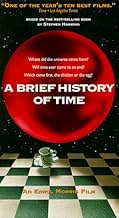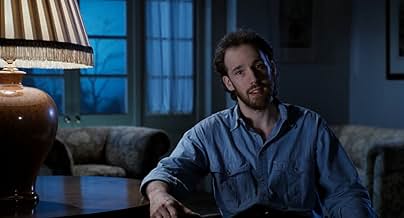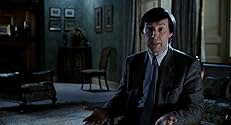IMDb-BEWERTUNG
7,3/10
6104
IHRE BEWERTUNG
Ein Film über das Leben und Werk des Kosmologen Stephen Hawking, der trotz seiner fast völligen Lähmung einer der größten Köpfe aller Zeiten war.Ein Film über das Leben und Werk des Kosmologen Stephen Hawking, der trotz seiner fast völligen Lähmung einer der größten Köpfe aller Zeiten war.Ein Film über das Leben und Werk des Kosmologen Stephen Hawking, der trotz seiner fast völligen Lähmung einer der größten Köpfe aller Zeiten war.
- Auszeichnungen
- 4 Gewinne & 3 Nominierungen insgesamt
Empfohlene Bewertungen
A Brief History of Time is not only a documentary on the beginning and the ending of the universal and reality as we know it, this is a story about the man and the genius known as Stephen Hawking. It is his story that reflects the story of time and change throughout the history of the universal. The style of the documentary / editing style of the interviews begin and end with a quick fade to black. Almost like blinking in between segments and interviews, the documentary gives you an odd feeling like this is the view point of Stephen Hawking and not the eye of the camera. The running time is only a little longer than an hour. It is a short story, then again, its subject matter could be talked about for days and days. An interesting and proud story.
As a physicist, talk about blackholes and cosmology gets my heart racing. However I found this presentation too slow and not packed with enough information for the interested layman (who is most likely to see it). If you have more than a passing curiosity in this sort of stuff, go to the library and check out some books. You will find they explain current scientific cosmologies with far more detail while at the same time filling you with more of a sense of wonder than this movie does. Also to set the record straight: Hawking is NOT considered the "greatest mind" or the world's "smartest person" as commonly asserted even among the user reviews here at the IMDb. Hawking himself has commented that "It is rubbish. It is just media hype. They needed somebody to fill the role model of disabled genius. At least I'm disabled." To be fair, he is probably a genius but among history's greatest scientists, people like Einstein, Newton, Gauss, and many others easily are even more highly regarded. This is not to disrespect Hawking who is a undoubtedly a great scientist but rather not to disrespect others who have done even more than he has. Anyhow, see the movie if you are truly into science. But if not, I think it would be boring for you.
Documentary maker Errol Morris tackles nothing less than the origin and fate of the universe, placing the often mind-bending theories of the popular science guide alongside a portrait of the author himself, British cosmologist Stephen Hawking, who for many years has been confined to a wheelchair, unable to move or speak, while his mind has been ranging freely all over creation. Hawking (and his ideas) can't help but inspire a compelling film, but there's an uncomfortable sense of déjà vu because the style is identical to 'The Thin Blue Line', with the same Philip Glass music score, the same oddball graphic digressions, and the same clips from old Hollywood movies (in this case Disney's 'The Black Hole', with mad scientist Maximillian Schell). But unlike the previous film there isn't any sense of resolution, because the questions posed by Hawking ("why do we remember the past, but not the future?") will likely never be answered. Out of respect for the scientist Morris downplays the deadpan ridicule that made his earliest films so amusing, but there's no shortage of the trademark dry wit, much of it provided by Hawking himself, who narrates most of the film with his own computer generated voice.
A very fine and intriguing documentary from Errol Morris about the life and work of physicist/celebrity Stephen Hawking, who revolutionized the way we think about the universe in his monumental book of the same name. The film is really divided into two stories, the life of Hawking as he struggles to overcome his paralysis, and the brilliant work he achieved in spite of his physical limitations. One gets the impression that had Hawking never became ill, he wouldn't have been as compelled to carry out the kind rigorous intellectual work that he of course did carry out, and (he himself notes that he was quite bored with life prior to his paralysis). Morris does a fine job with the material; the first half hour of the film suffers from a dry PBS feel, but the aesthetic and intellectual intensity takes off from there, the film never digresses into a mere sob story. Morris nearly always keeps the material more intellectually intriguing than it is uplifting and sentimental.
Errol Morris's "A Brief History of Time" manages to be, in its succinct 80 minutes, a moving biopic and a thought-provoking documentary. Based on the best-selling book of the same name by British cosmologist Stephen Hawking (1942- ), it is accessible for those who are not science experts (without being condescending), yet still have an interest in questions about the origins of the universe and, therefore, ourselves (will time ever come to an end? which came first, the chicken or the egg?; and so on).
Featuring interviews with the Hawkings (Isobel and Mary Hawkings, Stephen's mom and sister, respectively), Janet Humphrey (Stephen's aunt), several people related to the world of science (astrophysicists, professors, researchers, etc.), plus interviews and clips from lectures with Mr. Hawkings himself, we reflect on some of the most fundamental questions about our creation. The beyond reasonable, sensible and bright conclusions presented by this man whose body might be paralyzed, but whose mind is one of the greatest of all time (few would argue against this statement) make this film both a fascinating lecture (or, even better, meditation) and an inspirational life story. And with his fantastic reasoning and suavity, Hawkings ends up proving (as far as reasoning can prove, or define, the power of faith), the very existence of God. A great achievement of filmmaking, perception, philosophy, science, and perseverance. Bravo, Mr. Hawkings. Bravo, Mr. Errol Morris.
Featuring interviews with the Hawkings (Isobel and Mary Hawkings, Stephen's mom and sister, respectively), Janet Humphrey (Stephen's aunt), several people related to the world of science (astrophysicists, professors, researchers, etc.), plus interviews and clips from lectures with Mr. Hawkings himself, we reflect on some of the most fundamental questions about our creation. The beyond reasonable, sensible and bright conclusions presented by this man whose body might be paralyzed, but whose mind is one of the greatest of all time (few would argue against this statement) make this film both a fascinating lecture (or, even better, meditation) and an inspirational life story. And with his fantastic reasoning and suavity, Hawkings ends up proving (as far as reasoning can prove, or define, the power of faith), the very existence of God. A great achievement of filmmaking, perception, philosophy, science, and perseverance. Bravo, Mr. Hawkings. Bravo, Mr. Errol Morris.
Wusstest du schon
- WissenswertesAppearances to the contrary, all interviews were filmed on sets built for the movie.
- Zitate
Stephen Hawking: I wanted to understand how the universe began.
Top-Auswahl
Melde dich zum Bewerten an und greife auf die Watchlist für personalisierte Empfehlungen zu.
- How long is A Brief History of Time?Powered by Alexa
Details
- Erscheinungsdatum
- Herkunftsländer
- Sprache
- Auch bekannt als
- A Brief History of Time
- Drehorte
- Produktionsfirmen
- Weitere beteiligte Unternehmen bei IMDbPro anzeigen
Box Office
- Bruttoertrag in den USA und Kanada
- 2.279.692 $
- Eröffnungswochenende in den USA und in Kanada
- 84.025 $
- 23. Aug. 1992
- Weltweiter Bruttoertrag
- 2.279.692 $
- Laufzeit
- 1 Std. 20 Min.(80 min)
- Farbe
- Sound-Mix
- Seitenverhältnis
- 1.85 : 1
Zu dieser Seite beitragen
Bearbeitung vorschlagen oder fehlenden Inhalt hinzufügen































